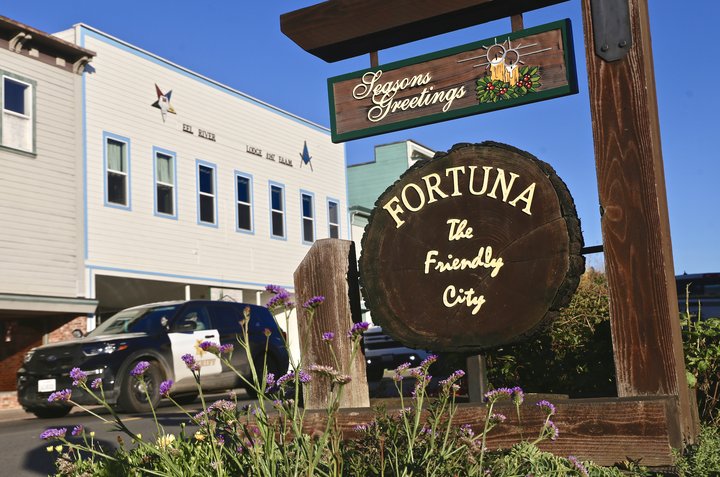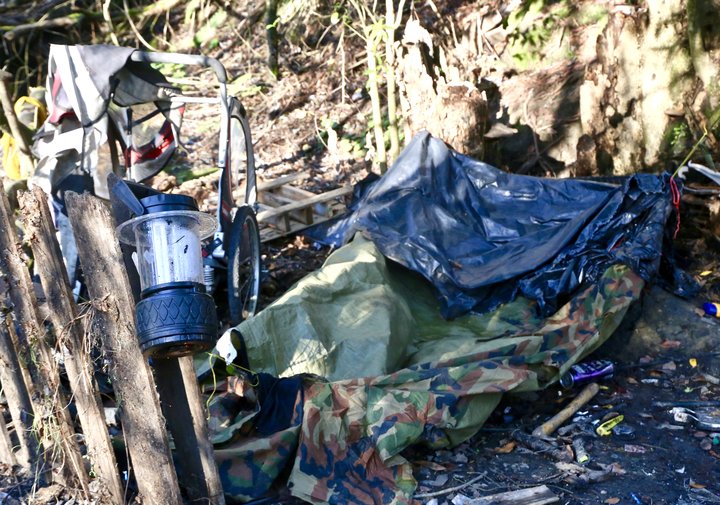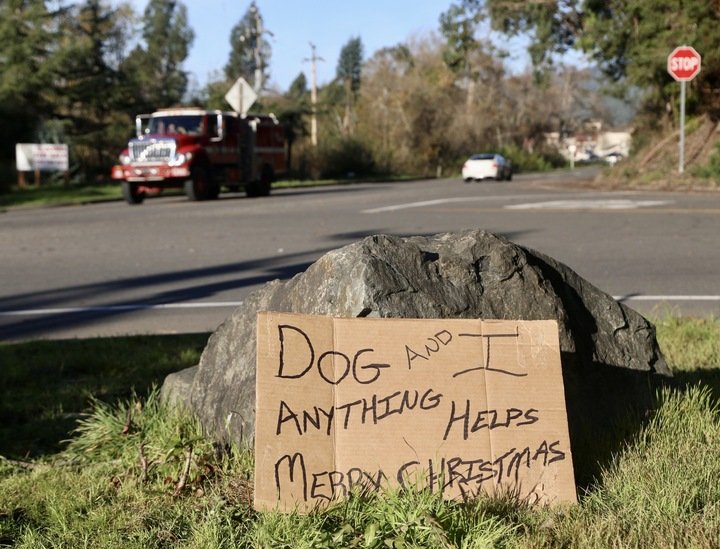UPDATE, Tuesday, Dec. 21:
At Monday night’s meeting the Fortuna City Council conducted a second reading of the proposed ordinance and again voted unanimously to implement it. The new anti-camping regulations will take effect on Feb. 18 Jan. 19.
Fortuna Police Chief Casey Day said his department’s approach will begin with a “soft launch” of the ordinance, offering education and literature to the city’s unhoused offenders while working with partner organizations.
Even with habitual offenders — those who refuse to adhere to the city’s ordinance and refuse help — the department plans to issue some kind of “warning citation” before charging them with a crime, Day said.
City Councilmember Mike Losey asked Day whether his officers will “make some effort to determine whether there are beds available in Eureka, say, at the homeless shelter.”
This was an acknowledgement of the standard established in Martin v. Boise, in which the Ninth Circuit Court of Appeals found that it’s unconstitutional to impose criminal penalties “for sitting, sleeping, or lying outside on public property for homeless individuals who cannot obtain shelter.” [Emphasis added.]
Day didn’t answer the question directly. He said his officers “have the ability” to check with shelters in Eureka and Arcata but stopped short of committing them to doing so.
“And your officers would make the effort or offer to even transport somebody to one or any of those shelters, correct?” Losey asked.
Day said it would be their “overarching goal to provide that type of assistance.” In the event that they find someone “open minded” and seeking help, he said “we really do try to facilitate that by making those phone calls and/or even, in past practice, arranging transportation to those facilities.”
###
Original post:

Law enforcement rolls down Main Street in Fortuna. | Photos by Andrew Goff.
###
The Fortuna City Council is set to pass an ordinance Monday evening that would criminalize camping throughout most of the city. City officials say it’s a much-needed remedy to problems caused by unhoused residents, but the American Civil Liberties Union of Northern California says the proposed regulations are both illegal and cruel.
At a December 6 council meeting councilmembers Mike Johnson and Jeremy Stanfield said they hope the ordinance has “teeth” to deal with people who’ve been sleeping in front of businesses and in other public places. Fellow councilmember Mike Losey agreed, saying, “I think our citizens are just going to relish being able to call in and report some of these violations and then see action taken to stop some of this.”
The ordinance, which you can read here, would make it a misdemeanor for any person to camp, occupy camp facilities or use “camp paraphernalia” in residential and commercial zones that cover the vast majority of the city’s jurisdiction. It would criminalize camping in any public place between the hours of 6 a.m. and 10 p.m. — plus the hours between 10 p.m. and 6 a.m. “unless there are no sleeping spaces practically available in any shelter or if there does not exist any viable alternative to sleeping in a public place.”
The City of Fortuna does not have any homeless shelters, though in interviews with the Outpost City Manager Merritt Perry and City Attorney Ryan Plotz said police officers have offered to drive people to shelters in Eureka and Arcata.
The City Council unanimously approved the ordinance on Dec. 6, though City Manager Merritt Perry explained that in order to take effect it must be read and approved a second time. That’s scheduled to happen at tonight’s City Council meeting, and if it is indeed adopted, the ordinance will go into effect in 30 days.
As first reported by the Times-Standard, Plotz crafted the ordinance, with input from Fortuna Police Chief Casey Day, to address complaints about the local homeless population while attempting to navigate the terms of the landmark 2018 Martin v. Boise ruling in the U.S. Court of Appeals for the Ninth District.
In that case, the Ninth Circuit panel found that it’s unconstitutional to impose criminal penalties “for sitting, sleeping, or lying outside on public property for homeless individuals who cannot obtain shelter.” The Eighth Amendment bars punishing a person only “for lacking the means to live out the ‘universal and unavoidable consequences of being human,’” the court found.
The decision has caused many cities across the western United States, including Eureka, to redraft their own anti-camping ordinances. It has also left a good deal of confusion in its wake as municipalities grapple with the lack of specifics in the ruling.
For example, how do you determine whether there are enough shelter beds available when your city doesn’t have any of its own? The court does not explain how to determine how many are enough and over what geographic area.

Tarps, a lantern and other signs of a makeshift camp on the outskirts of Fortuna.
###
The Boise decision “doesn’t specify a distance in terms of what’s considered available or not,” Plotz said in a phone interview last week. “It’s one of the areas that Boise has received some criticism from the League of California Cities for not providing that type of detailed guidance.”
Perry told the Outpost that Fortuna approaches the issue of homelessness regionally. When Fortuna recently received $400,000 in CARES Act funding to address homelessness, it wound up giving the money away.
“And so what we did is we made an agreement with the City of Eureka to put half of that towards their UPLIFT Program, and then we put the other half towards Arcata House [Partnership],” he said. The city has also provided funding to Sean Swanson, founder of the nonprofit River Life Foundation, “and he’s been really good at connecting people experiencing homelessness with services,” Perry said. “So we’ll find a way to get people to where there is shelter” — assuming they’re willing to go, he added.
At the Dec. 6 meeting, Plotz told the council that the Fortuna Police Department has largely stopped criminal enforcement of its anti-camping regulations as a result of the Boise case, and residents have noticed an uptick in the number of people building temporary shelters and lying in front of businesses on Main Street.
“This ordinance draws an important distinction between camping on the one hand and sleeping on the other, because the aim of the Martin v. Boise case was to prevent cities from criminalizing sitting, sleeping or lying on public property,” he said. “It does not speak to the larger issue of camping and the things that that comes with, including the erection of temporary shelters.”
The ACLU of Northern California disagrees with Plotz’s assessment. In a statement sent to the Outpost last week the organization says:
The Fortuna City Attorney’s claim that focusing on ‘camping’ rather than “sleeping” makes their ordinance legal is false and misrepresents Martin v. Boise. Martin does not apply to sleeping only. It covers “the unavoidable consequences of being human,” which includes the need for shelter, cooking, and having some personal possessions available.
Homelessness is not a “choice” that can be deterred by enacting laws that criminalize it. The City of Fortuna’s plan to criminally charge unhoused people for existing in public is cruel, unlawful, and does nothing proactive to solve the crisis of homelessness. Additionally, the suggestion from one councilman that residents of Fortuna will “relish” calling in to report unhoused people attempting to survive outdoors suggests a concerning lack of empathy for the plight of unhoused people—people who remain human beings with legal rights regardless of their housing status.”
Plotz said courts have struggled to interpret the language in the Boise decision for not being specific enough to provide real guidance. A lot is left up to interpretation. Fortuna’s ordinance bans camp paraphernalia, which it says “includes, but is not limited to, tents or tent-like structures, cots, hammocks, personal cooking facilities and similar equipment.” The definition explicitly excludes blankets, sleeping bags or bedrolls.
But what about the lantern in the photo above? Is that camp paraphernalia? What about those tarps? Are they being used as blankets? The ordinance says camp facilities, including lean-tos, are prohibited. What about a big piece of cardboard? Would that violate the rules?
Plotz said it could depend on how it’s being used and where. A lot will be left up to individual officers’ discretion, he said. At tonight’s meeting he expects either Perry or the police chief to talk about what programs are available and possible alternatives to criminal citations for violations of the new ordinance.
Day, the police chief, said this ordinance represents a needed update to regulations in “The Friendly City.” At the public meeting two weeks ago he said, “I really feel strongly that for the public morale and health and safety of the community, that this revision to the municipal code is exactly what our community needs.”

A cardboard sign rests against a rock just outside city limits.
CLICK TO MANAGE